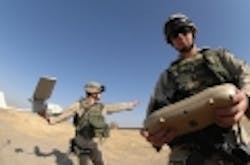Rad-hard ASIC development for aerospace and defense applications is goal of Aeroflex-Boeing partnership
COLORADO SPRINGS, Colo., 22 Aug. 2010. Aeroflex Colorado Springs in Colorado Springs, Colo., and Boeing Solid-State Electronics Development (SSED) in Kent, Wash., are working together to develop 90-nanometer rad-hard application-specific integrated circuits (ASICs) for aerospace and defense applications.
The companies are announcing a 90-nanometer radiation-hardening-by-design (RHBD) license agreement and technology development partnership to move rad-hard ASIC technology toward qualification for military and aerospace applications while preparing the next generation of 45- and 32-nanometer silicon on insulator technology for development.
The companies are collaborating on developing the UT90nHBD radiation-hardened integrated circuit, which radiation hardened technology from 100 kilorads to 1 megarad total ionizing dose (TID), and targeting single event upset (SEU) at <5.0E-9 errors/bit-day, single event latchup (SEL) at >100 MeV-cm2/mg@ 125oC, and dose rate upset at >1.0E9 (Si)/sec. All of Aeroflex's current offerings of Digital RadHard ASICs are QML Q and V qualified.
The partnership "will provide aerospace system developers with access to leading edge integrated circuits necessary to achieve the highest performance and system effectiveness," says Warren Snapp, manager of solid-state electronics development at Boeing Research & Technology. "Customers will be able to design RadHard ASICs for space applications with this ASIC family to realize significant dynamic power, cell density, and radiation-hardened performance [TID, SEE, Dose Rate] benefits, says Roger Van Art, vice president of strategic business at Aeroflex Colorado Springs.
For more information contact Aeroflex Colorado Springs online at www.aeroflex.com or Boeing SSED at www.boeing.com.
